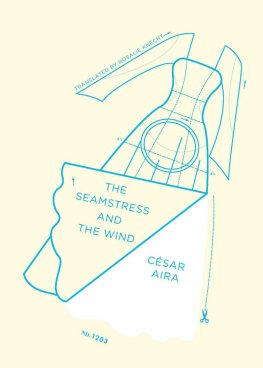Cesar Aira - Shantytown
Here you can read online Cesar Aira - Shantytown full text of the book (entire story) in english for free. Download pdf and epub, get meaning, cover and reviews about this ebook. year: 2013, publisher: New Directions, genre: Prose. Description of the work, (preface) as well as reviews are available. Best literature library LitArk.com created for fans of good reading and offers a wide selection of genres:
Romance novel
Science fiction
Adventure
Detective
Science
History
Home and family
Prose
Art
Politics
Computer
Non-fiction
Religion
Business
Children
Humor
Choose a favorite category and find really read worthwhile books. Enjoy immersion in the world of imagination, feel the emotions of the characters or learn something new for yourself, make an fascinating discovery.
- Book:Shantytown
- Author:
- Publisher:New Directions
- Genre:
- Year:2013
- Rating:3 / 5
- Favourites:Add to favourites
- Your mark:
- 60
- 1
- 2
- 3
- 4
- 5
Shantytown: summary, description and annotation
We offer to read an annotation, description, summary or preface (depends on what the author of the book "Shantytown" wrote himself). If you haven't found the necessary information about the book — write in the comments, we will try to find it.
Shantytown — read online for free the complete book (whole text) full work
Below is the text of the book, divided by pages. System saving the place of the last page read, allows you to conveniently read the book "Shantytown" online for free, without having to search again every time where you left off. Put a bookmark, and you can go to the page where you finished reading at any time.
Font size:
Interval:
Bookmark:
Csar Aira
Shantytown
I
One way Maxi chose to spend his time was helping the local cardboard collectors to transport their loads. An act performed once, on the spur of the moment, had developed over time into a job that he took very seriously. It had begun with something as natural as relieving a child or a pregnant woman of a load that seemed too great for someone like that to bear (although the woman or the child was, in fact, bearing it). Before long he was indiscriminately helping children and adults, men and women: he was bigger and stronger than any of them, and anyway he did it because he wanted to, not because he was asked. It never occurred to him to see it as an act of charity or solidarity or Christian duty or pity or anything like that. It was something he did, that was all. It was spontaneous, like a hobby. Had anybody asked him why, he would have had trouble explaining, given how terribly hard it was for Maxi to express himself, and in his own mind he didnt even try to justify what he was doing. As time went by, his dedication to the task increased, and if one day, or rather one night, he had been unable to do his rounds in the neighborhood, he would have had the uncomfortable feeling that the collectors were missing him and thinking, Where can he be? Why hasnt he come? Is he angry with us? But he never missed a night. There were no other obligations to keep him from going out at that time.
The expression cardboard collectors was a euphemism, which everyone had adopted, and it conveyed the intended meaning clearly enough (although the less delicate scavengers served that purpose too). Cardboard, or paper, was only one of their specialties. They also collected glass, cans, wood. . in fact, where there is need, there is no specialization. They had to find a way to get by and they werent going to turn up their noses, not even at the remnants of food that they found in the garbage bags. And perhaps those borderline or spoiled leftovers were, in fact, the real objective, and all the rest cardboard, glass, wood, tin no more than a respectable front.
In any case, Maxi didnt ask himself why they were doing what they did. He tactfully averted his gaze when he saw them rummaging through the trash, as if all that mattered to him were the loads that they assembled, and only their weight, not their contents. He didnt even ask himself why he was doing what he did. He did it because he could, because he felt like it, because it gave his evening walk a purpose. When he began, in autumn, he would set off in the sinister half-light of dusk, but by the time the habit was entrenched, the year had turned, and it was dark when he started. That was when the collectors came out, not because they wanted to, or were trying to work under cover of night, but because people put out their trash at the end of the day, and, as soon as they did, the race was on to beat the garbage trucks, which came and took it all away.
That time of day had always been hard for Maxi ever since he was a boy, and now that he was entering his twenties, it was even worse. He suffered from so-called night blindness, which of course is not blindness at all, just a troublesome incapacity to distinguish things in dim or artificial light. As a result of this problem (or was it the cause?) his circadian rhythm was markedly diurnal. He woke up at first light, without fail, and the shut-down of all his systems at nightfall was sudden and irrevocable. As a child he had fitted in well, because thats the natural rhythm of children, but in his teenage years he had started to lose touch with his friends and classmates. They were all eagerly exploring the night, enjoying the freedom it granted them, coming to maturity as they learned its lessons. He had tried too, without success, and had given up some time ago. His path was solitary, all his own. At the age of about fifteen, already falling out of step with the routines and pursuits of his peers, he had started going to the gym. His body responded very well to weight training, and he had developed muscles everywhere. He was very tall and solidly built; without the training he would have been fat. As it was, when people saw him in the street, they thought: meathead or brainless hulk, and they werent too far from the truth.
In March he had sat exams for some of the subjects that he still had to pass to get his high school diploma, and there would be more in July or December. . or not. His studies had languished in a slow but steady and definitive way. Looking to the future, both he and his parents had come to accept that hed never go back to being a student: he wasnt cut out for it; there was no point. This was confirmed by looking back: hed forgotten almost everything that hed learned in the long years spent at high school. At the intersection of the future and the past were those aptly named preliminary subjects, suspended in a truly perplexing uncertainty. So when that autumn began, he was at a loose end. Over the summer hed studied in a desultory sort of way, and his parents were resigned to the fact that he always took a long break after exams, not to recover from the effort so much as from the sad, inadequate feeling that came over him when he studied. Although he had flunked the three exams in March, or maybe because of that, the gulf between him and the world of education deepened even further. In theory he was supposed to try again in July, and then, according to the plan, re-sit exams for another two subjects (or was it three?), but he couldnt even think about studying, and nobody reminded him. So his only activity was going to the gym. His father, a wealthy businessman, didnt pressure him to look for work. There would be time for him to find his way. He was a biddable, affectionate young man, happy to stay at home; quite the opposite of his only sibling, a younger sister, who was rebellious and headstrong. They lived in a comfortable modern apartment near Plaza Flores.
There were a number of reasons why Maxi had begun to go walking in the evenings at the end of summer. One was that, around that time, the arguments between his mother and his sister tended to intensify and fill the apartment with shouting. Another was that his body, by then, had energy to spend, and a sort of alarm had begun to sound. He went to the gym in the morning, from opening time until midday. After lunch he took a nap, and after that he watched television, did some shopping, hung around at home. . During those long hours of inactivity he grew increasingly restless, and in the end he simply had to get himself moving again. He had tried running in Parque Chacabuco, but his body was a bit too heavy, too muscular, and his gym instructor had advised him against it, because the jolting could upset the delicate balance of his joints, which were already under stress from the weight of muscle. Anyway, he didnt enjoy it. Walking, on the other hand, was the ideal form of exercise. His walks coincided with the appearance of the collectors, and that coincidence was how it all began.
Cardboard collecting or scavenging had gradually established itself as an occupation over the previous ten or fifteen years. It was no longer a novelty. The collectors had become invisible because they operated discreetly, almost furtively, at night (and only for a while), but above all because they took refuge in a social recess that most people prefer to ignore.
They came from the crowded shantytowns in Lower Flores, to which they returned with their booty. Some worked all alone (in which case Maxi left them to it), or driving a horse and cart. But most of them worked in family groups and pulled their carts themselves. If Maxi had stopped to wonder whether or not theyd accept his help, or tried to find the right words, it would never have happened. But one day he came across a child or a pregnant woman (he couldnt remember which), barely able to shift an enormous bag, and he took it from the childs or womans hands, just like that, without a word, lifted it up as if it were a feather and carried it to the corner, where the cart was. That first time, perhaps, they said thank you, and went away thinking, What a nice boy. He had broken the ice. Before long he could help anyone, even the men: they didnt take offence; they pointed out where theyd left their carts, and off he went. Nothing was heavy for him; he could have carried the collectors as well, under the other arm. They were tough, resilient people, but scrawny and malnourished, worn out by their trudging, and very light. The only precaution he learned to take was to look into the cart before loading it up, because there was often a baby on board. From the age of two, the children scampered around among the piles of garbage bags with their mothers, helping, in their way, with the search, learning the trade. If the family was in a hurry and the children were lagging behind, rather than listening to the impatient shouting of the parents, Maxi would pick up all the kids, as if gathering toys to tidy a room, and head for the cart. Actually, they were always in a hurry because they were racing against the garbage trucks, which were hard on their heels in certain streets. And ahead of them, in the next block, they could see big piles of promising bags (they had an intuitive sense of where it would be worth their while to stop), and this made them anxious: an urgent buzz would spread through the group; some would shoot off ahead, the father and one of the sons, for example, because the father was the best at undoing the knots and opening the bags and spotting the good stuff in the dark; meanwhile the mother would stay behind pulling the cart, because they couldnt leave it too far away. . Thats where Maxi came in. Hed tell her to join her husband; hed bring the vehicle. That was something he could do; all the rest was up to them. Hed grip the two handles, and whether the cart was empty or full (sometimes it was piled high), hed pull it along almost effortlessly, as if he were playing a game, using his excess strength to stop it jolting, so as to spare the mended axle and the dicey wheels, and not to disturb the baby asleep inside.
Font size:
Interval:
Bookmark:
Similar books «Shantytown»
Look at similar books to Shantytown. We have selected literature similar in name and meaning in the hope of providing readers with more options to find new, interesting, not yet read works.
Discussion, reviews of the book Shantytown and just readers' own opinions. Leave your comments, write what you think about the work, its meaning or the main characters. Specify what exactly you liked and what you didn't like, and why you think so.











